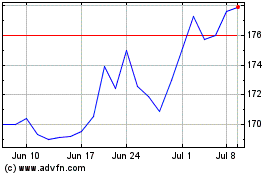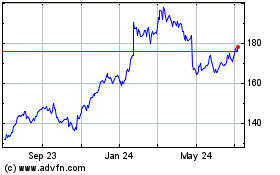IBM CEO Says Automation Won't Decimate Job Market
October 06 2015 - 1:00PM
Dow Jones News
ORLANDO, Fla.—The rise of cognitive technology, or machines that
can approximate the way people think, will lead to big changes in
how people work and in the economy itself, International Business
Machines Corp. CEO Virginia Rometty said Tuesday.
"This is not about replacing people. It is about augmenting what
man does…this helps us do things we couldn't do," Ms. Rometty said
Tuesday at the Gartner Symposium, a gathering of CIOs and business
technology professionals.
IBM made news today with the announcement of a new 2,000-person
consulting unit, the Cognitive Business Solutions Group, that will
help businesses make use of Watson , a decision-support platform
the company hopes to apply to a range of industries such as health
care. The thesis is that there's too much information for even a
well-educated professional in health or law or just about any area
to master, and the artificial intelligence and other algorithms at
the heart of Watson can provide answers far more quickly than can
the human mind.
The prospect of technology-driven job destruction is a matter of
great debate for many scientists, technologists, and economists,
some of whom predict massive losses in the labor market. In the
past, new technology has destroyed jobs and created new ones, but
some experts wonder if the increasing power of information
technology will leave relatively less and less for people to
do.
"The economic challenge of the future will not be producing
enough. It will be providing enough good jobs," former U.S.
Treasury Secretary Lawrence Summers argued last year in The Wall
Street Journal. "Technology is allowing the production of far more
output with far fewer people."
Ms. Rometty isn't among the doomsayers. "Eventually, everyone
will have some skills around data science and data. It will change
the way we educate people. You begin to create whole new sets of
jobs. I see that with utility workers. I see that in all different
kinds of ways…Individual jobs become richer," she said.
That isn't to say what IBM refers to as cognitive technology
won't lead to massive changes. Cognitive technology "changes the
basis of economic competition," she said.
In the near future, all businesses will be digital, and
cognitive technology will provide a basis for competitive
advantage, as companies figure out new ways to take advantage of
it, according to Ms. Rometty. "Digital is necessary, but not
sufficient. Once you are digital, this is how you differentiate,"
she said. "It will scale expertise…it will change the way you
engage with customers. It will change processes. I see this as very
differentiating. Everyone who has lived through disruption, I think
is ready to be the disrupter. I think this allows you to take the
lead."
Write to Steven Rosenbush at steven.rosenbush@wsj.com
Access Investor Kit for "NIRI Demo Co"
Visit
http://www.companyspotlight.com/partner?cp_code=P479&isin=US4592001014
Subscribe to WSJ: http://online.wsj.com?mod=djnwires
(END) Dow Jones Newswires
October 06, 2015 12:45 ET (16:45 GMT)
Copyright (c) 2015 Dow Jones & Company, Inc.
International Business M... (NYSE:IBM)
Historical Stock Chart
From Mar 2024 to Apr 2024

International Business M... (NYSE:IBM)
Historical Stock Chart
From Apr 2023 to Apr 2024
